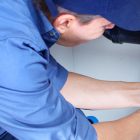Washing machine noises can be unsettling, especially when you’re unsure of what’s causing them. These strange sounds can range from rattling and banging to grinding and squealing. While your machine is designed to handle heavy loads, it’s not meant to sound like a drum line! But don’t worry, in this blog, we’ll guide you through understanding and fixing those washing machine noises.
If you need assistance, don’t hesitate to contact us at +971545356777.
Contents
- 1 1. Common Types of Washing Machine Noises and Their Causes
- 2 2. Why Is My Washing Machine Making a Grinding Noise?
- 3 3. Thumping or Rattling Sounds in Your Washing Machine: Causes and Fixes
- 4 4. Why Your Washing Machine Makes a Humming Sound During Operation
- 5 5. How to Prevent Washing Machine Noises: Regular Maintenance Tips
- 6 Conclusion: Keep Your Washing Machine Quiet and Efficient
1. Common Types of Washing Machine Noises and Their Causes
First, let’s break down the various types of washing machine noises you might encounter. From knocking to thumping, each sound usually points to a specific issue.
Knocking or Banging Washing Machine Noises
One of the most common washing machine noises is a knocking or banging sound. This usually happens when your load is unbalanced. The drum is designed to spin smoothly, but if clothes bunch up on one side, the uneven distribution can lead to a noisy spin cycle.
Causes:
- Overloading the washing machine with too many clothes.
- Bulky items like blankets or towels bunching together.
- Loose parts in the drum or suspension rods.
Solutions:
- Distribute your laundry evenly in the drum.
- Avoid washing heavy items in one go; spread them across several loads.
- Check if the machine is level and adjust the feet if necessary.
Squealing or Screeching Noises
A squealing or screeching washing machine noises is often linked to worn-out bearings or a damaged belt. When the drum or motor bearings are old, they create friction, leading to that high-pitched squeal.
Causes:
- Worn-out drum bearings.
- Damaged or misaligned drive belt.
- Dry motor bearings that need lubrication.
Solutions:
- Replace worn-out bearings and belts. If you’re unsure how to do this, call a professional.
- Lubricate motor bearings to ensure smooth operation.
These washing machine noises are not just an inconvenience. Left untreated, they can lead to bigger problems, including motor failure. So, it’s best to address them promptly.
2. Why Is My Washing Machine Making a Grinding Noise?
One of the most worrisome sounds your washing machine can make is a grinding noise. It’s that unmistakable, harsh sound that makes you think your washing machine is chewing up metal.
Causes of Grinding Noises:
- Foreign Objects: Small items like coins, screws, or buttons can get stuck between the drum and the tub, causing grinding.
- Worn Bearings: Over time, bearings that support the drum can wear out. When they do, the drum may not spin smoothly, creating that grinding sound.
- Worn Motor Coupling: In older washing machines, the motor coupling may wear down, leading to grinding noises when the motor tries to engage.
How to Fix Grinding Noises:
- Check for Foreign Objects: Start by inspecting the drum and filter for any foreign objects. Sometimes a forgotten coin or button can cause havoc.
- Replace the Bearings: Worn bearings are more complicated to replace, but if your washing machine is older, it might be worth doing. This repair can extend your washing machine’s life.
- Inspect the Motor Coupling: If the motor coupling is worn out, replace it to ensure the drum spins correctly.
If you’re unsure about tackling these repairs yourself, give us a call at +971545356777, and we’ll send an expert to help.
3. Thumping or Rattling Sounds in Your Washing Machine: Causes and Fixes
Another common washing machine noise is a thumping or rattling sound. This often indicates that something is loose or out of place inside the machine.
Causes of Thumping or Rattling:
- Loose Drum: If the drum isn’t secured correctly, it can move during the spin cycle, causing a loud thumping noise.
- Loose Parts: Over time, screws and bolts can loosen inside the washing machine, leading to rattling during operation.
- Blocked Pump: Sometimes, objects can get stuck in the drain pump, which can cause a rattling or thumping sound.
How to Fix Thumping or Rattling Noises:
- Secure the Drum: Ensure that the drum is securely fastened. This can often be fixed by adjusting the suspension rods or springs inside the machine.
- Tighten Screws and Bolts: Regular maintenance involves checking that all screws and bolts are tight. A loose screw can cause unnecessary rattling.
- Check the Pump: If the rattling noise is coming from the pump area, inspect it for blockages.
Regular maintenance can prevent many of these washing machine noises from occurring. If you’re unsure about checking these parts yourself, it’s always a good idea to consult a professional technician at +971545356777.
4. Why Your Washing Machine Makes a Humming Sound During Operation
A gentle hum is normal, but if the humming sound becomes loud or constant, there may be an underlying issue. Identifying this washing machine noise early can save you from more serious damage.
Possible Causes of Humming Noises:
- Blocked Drain Pump: A clogged or blocked drain pump often makes a loud humming sound. This happens when the machine tries to drain water, but something is obstructing the pump.
- Faulty Motor: In some cases, a motor struggling to operate can produce a humming sound.
- Object Stuck in the Pump: Small objects can easily get stuck in the washing machine pump, leading to that frustrating hum.
Solutions:
- Unclog the Drain Pump: Inspect the drain pump for any blockages. This can be done by removing the pump cover and manually clearing debris.
- Check for Objects: Look for any foreign objects that might be stuck in the pump or impeller. Clearing these objects can resolve the humming noise.
- Replace the Motor: If the motor is faulty and causing the noise, you’ll likely need to replace it. This isn’t always a DIY job, so contact a technician if needed.
In some cases, a washing machine’s normal operation may include a slight hum, but if the noise becomes more pronounced, it’s worth investigating. For expert help, give us a call at +971545356777.
5. How to Prevent Washing Machine Noises: Regular Maintenance Tips
Now that we’ve discussed how to troubleshoot different types of washing machine noises, let’s talk about prevention. Regular maintenance can help keep your washing machine quiet and running smoothly for years.
1. Balance Your Loads Properly
One of the easiest ways to prevent washing machine noises is to balance your loads. Avoid overstuffing the machine, and distribute clothes evenly. Bulky items like blankets should be washed separately to prevent an unbalanced drum.
2. Level the Machine
An unlevel washing machine can cause a lot of noise, especially during the spin cycle. Make sure your machine is level by adjusting the feet. Most machines have adjustable legs that you can raise or lower to even out the appliance.
3. Inspect the Drum and Seals
Check your washing machine drum regularly for any signs of wear or damage. A damaged drum or loose seal can lead to various noises, from squealing to grinding. Replacing worn parts early can save you from costly repairs later.
4. Lubricate Bearings and Moving Parts
Many washing machine noises are caused by friction between moving parts. Lubricating bearings and other mechanical components can help reduce wear and tear. Use a manufacturer-approved lubricant for best results.
5. Schedule Regular Professional Inspections
Even with regular at-home maintenance, it’s a good idea to have your washing machine professionally inspected once a year. A technician can check the motor, belts, and other internal parts for wear. Early detection of problems can prevent a breakdown and save you money on repairs.
Need help maintaining your washing machine? Call us at +971545356777 for expert service.
Conclusion: Keep Your Washing Machine Quiet and Efficient
Washing machine noises are more than just an annoyance; they’re often an indicator that something isn’t working as it should. By learning to identify the types of sounds your machine makes—whether it’s knocking, grinding, or rattling—you can address the issue before it becomes a bigger problem.
Remember, many of these problems can be solved with simple adjustments or replacements. However, if you’re ever in doubt, don’t hesitate to call in a professional. You can reach us at +971545356777 for expert assistance.
Taking care of your washing machine through regular maintenance and prompt repairs ensures that it runs efficiently and lasts longer. So, next time you hear a strange noise, don’t ignore it—get to the root of the problem and enjoy peace of mind!



